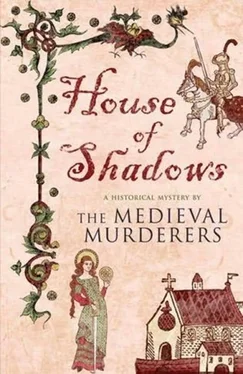Chaucer wondered how far knowledge of the affair between John and Katherine had spread. Certainly it was whispered about at court. Had the rumours reached as far as Bermondsey Priory? Did people believe that Chaucer, because he was brother-in-law to the woman who was Gaunt’s lover, had to be humoured? Or was Richard Dunton’s belief in his ‘influence’ connected only to his reputation as a court poet? Whichever version was right, it was sufficient to open a few doors.
And opening doors was what Geoffrey Chaucer was about to do now. He slipped inside the entrance and peered at the precipitous flight of steps running down into darkness. This must be the place: the storage space under the cellarer’s area of the priory, the place where John and Simon Morton had been sent to carry out some repairs before one fell sick and the other died prematurely.
He’d waited until the next call to prayer (the life of the priory continuing as normal) before searching out the spot first described to him by Andrew. He had a kind of licence to wander and investigate, yet he preferred to do it more or less unobserved. He had a particular reason for descending to this subterranean chamber. It was as a result of the hints dropped by Mistress Morton and Andrew the mason and a conversation with the cellarer, Brother Michael.
The monk who went by the name of Michael was a significant figure in the life of the priory, responsible not merely for overseeing provisions and fuel supplies but also for the upkeep of the house. The individual who held the position of cellarer or bursar had to be capable – and preferably devout – since his job entailed frequent absences and therefore exemption from other monkish duties. He was out and about in the world, dealing with suppliers and carriers. Chaucer had noticed the cellarer at supper the previous evening. Brother Michael conformed to the traditional, slightly hostile picture of the monk. He had a generous shape and a round, cheerful face. Chaucer was reminded of a tavern-keeper he knew in Southwark, a man called Harry Bailey, who was all teeth and smiles on the surface but shrewd and watchful underneath.
Later in the morning and after the discovery of Adam’s body in the monks’ cemetery, Brother Michael had sought Geoffrey out, no doubt under instructions from the prior. It was wonderful, thought Chaucer, what having a foothold in court – or being related to a royal mistress – could do. People became so willing to help.
‘The prior says that you wish to know about Adam, Master Chaucer. I don’t know much but I will tell you what I can if you come with me.’
They entered the cellarer’s building on the western side of the cloister, and Brother Michael ushered Geoffrey upstairs to a well-appointed chamber. Chaucer was surprised to see there the lay person who’d been standing by the outer gatehouse and who had teased the simple Will. He was hovering in the region of a table piled with papers. He seemed about to speak to the cellarer when he observed Chaucer entering the room behind Brother Michael. The monk didn’t trouble to keep the displeasure out of his voice when he said: ‘What are you doing here, Osbert?’
‘I thought I dropped something when I was here earlier, master, but I must have been mistaken.’
Osbert brushed past Brother Michael and left the room, without looking either man in the eye. ‘Insolent fellow,’ said the monk. Then, without asking his guest whether he wanted a drink, he poured red wine into a goblet, which he passed to Chaucer, indicating that he should make himself at ease in one of the chairs. He filled his own goblet and sat down with a plump sigh opposite Geoffrey. Chaucer noticed a black cat extended on the windowsill, probably the one he’d seen earlier in the inner court. He waited. He was interested to see what approach Brother Michael would take.
‘Of course, I took the man on only as an act of charity,’ were the cellarer’s first words. ‘He said he had been working at one of our sister houses, St Pancras of Lewes. He said that his hand had been crushed by a falling block of stone.’
‘You say “he said”,’ said Geoffrey. ‘It sounds as though you didn’t believe him.’
Brother Michael shrugged and spilled some wine on his habit. He didn’t appear to notice. Like blood, the wine stain would hardly show. ‘Master Chaucer, I am not a man of the world as you are. If someone tells me something, I tend to believe it. If a man comes to me desperate for employment and claims to have received an injury while working in the service of our order at another house, then it is almost my duty to see that such a person is accommodated. He had already applied to me once and I had turned him down because, to be truthful, I didn’t much care for his looks. But when he asked again and since we were short-handed on account of sickness, I took him on.’
‘Shouldn’t it have been the responsibility of the Lewes house to show him charity in the first place, Brother Michael? And why did the dead man end up here in Bermondsey?’
‘I don’t know, Master Geoffrey, if I may call you that. The man hinted to me that he had a falling-out with someone in St Pancras, and in view of the tragic events that have occurred here I think that that is more than likely. As for why he finished up in the priory, well, some men prefer to wander where their feet take them…and his feet brought him to Bermondsey. Another drink?’
Chaucer shook his head. The cellarer poured himself more wine. His large fingers were loaded with rings. Geoffrey was reminded of the ring still in his pocket, the one handed to him by simple William together with the comment about bones. Something about Brother Michael’s story didn’t altogether convince Geoffrey. Whether it was the cellarer’s claim not to be a man of the world, a sure sign (in Chaucer’s eyes) that the speaker was the opposite of unworldly, or whether it was his defensive readiness to explain why he’d taken on Adam, he couldn’t say.
‘We needed another man, you understand. One of the masons – what’s his name? Simon – he was sick. Still is, I think.’
‘I understand that Simon Morton fell sick with a fever after working with his brother in a cellar below here,’ said Geoffrey. He was surprised, and gratified, at the change in Brother Michael’s expression at these words. The broad, cheerful face closed up. Chaucer was again reminded of the Southwark tavern-keeper, the way Harry Bailey’s expression would alter if there was a dispute over a reckoning. To conceal the change, Brother Michael carried the goblet to his full lips once more. When he brought it down again, he’d recovered.
‘That’s true. He caught a fever after working in the cellar. Post hoc sed non propter hoc , though. You understand me?’
‘It was a coincidence that Simon Morton got sick, and nothing to do with what he was working on in the cellar. Yes, I understand. What were he and his brother doing, by the way?’
‘Some stonework had given way down there. They were repairing it. They are masons, Master Chaucer. That is their job.’
‘I hear there are tales told about the place.’
‘This is an old foundation. It is built on dead men’s bones. Of course, there are tales told about every corner of the priory. There is nothing remarkable about the cellar, nothing at all. Is there anything more you wish to know? I have a heap of business to attend to.’
Brother Michael gestured towards the table laden with papers and parchment. At some point during their conversation the black cat had removed itself from the windowsill and settled itself among Brother Michael’s papers. Noticing this, the cellarer tut-tutted but made no move to shift the animal. Chaucer would have wagered heavily that the cellarer was not really concerned about the business he had to attend to. The cat would remain undisturbed as a paperweight. But he took the hint and got up to leave, thanking Michael for his time.
Читать дальше












